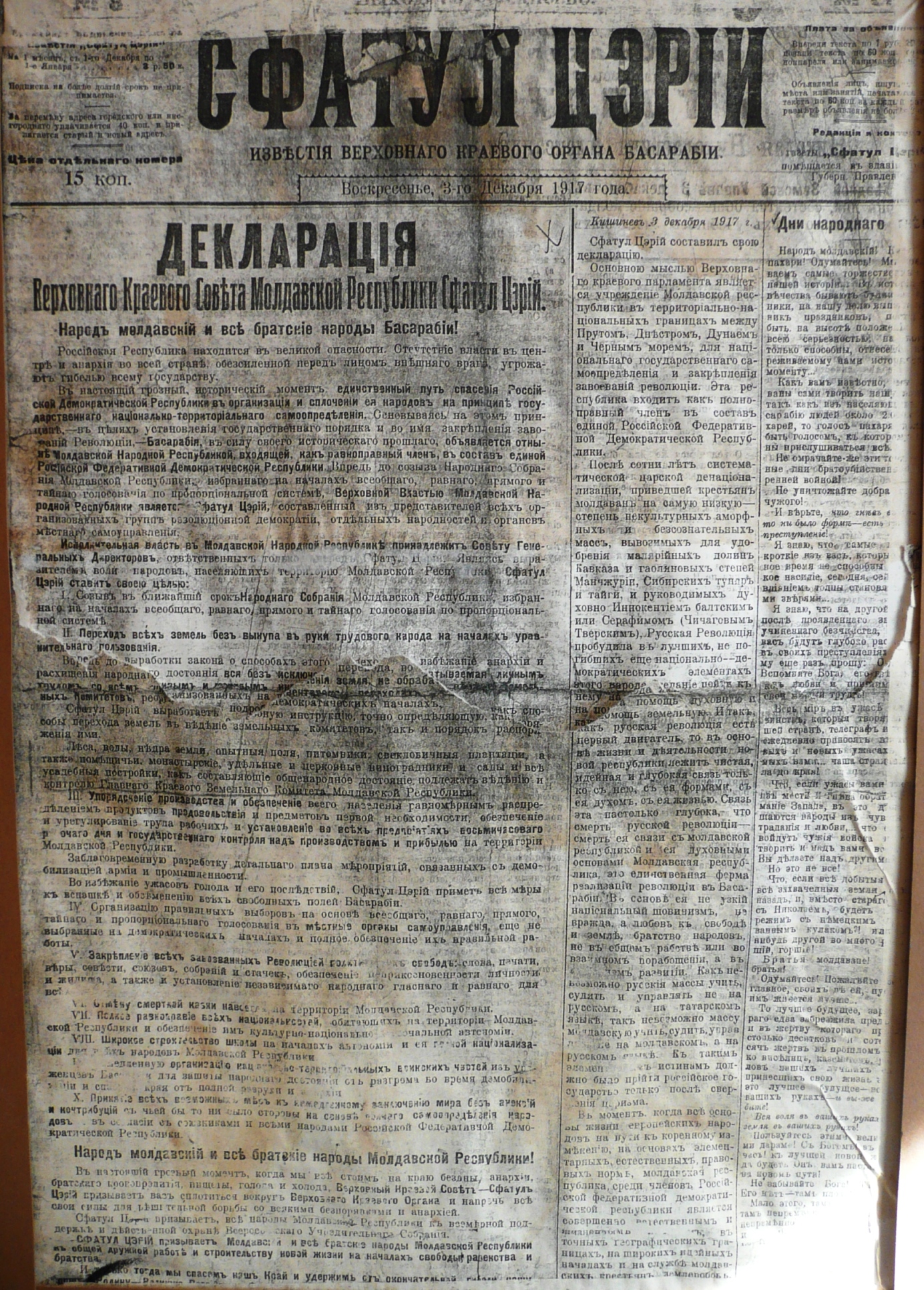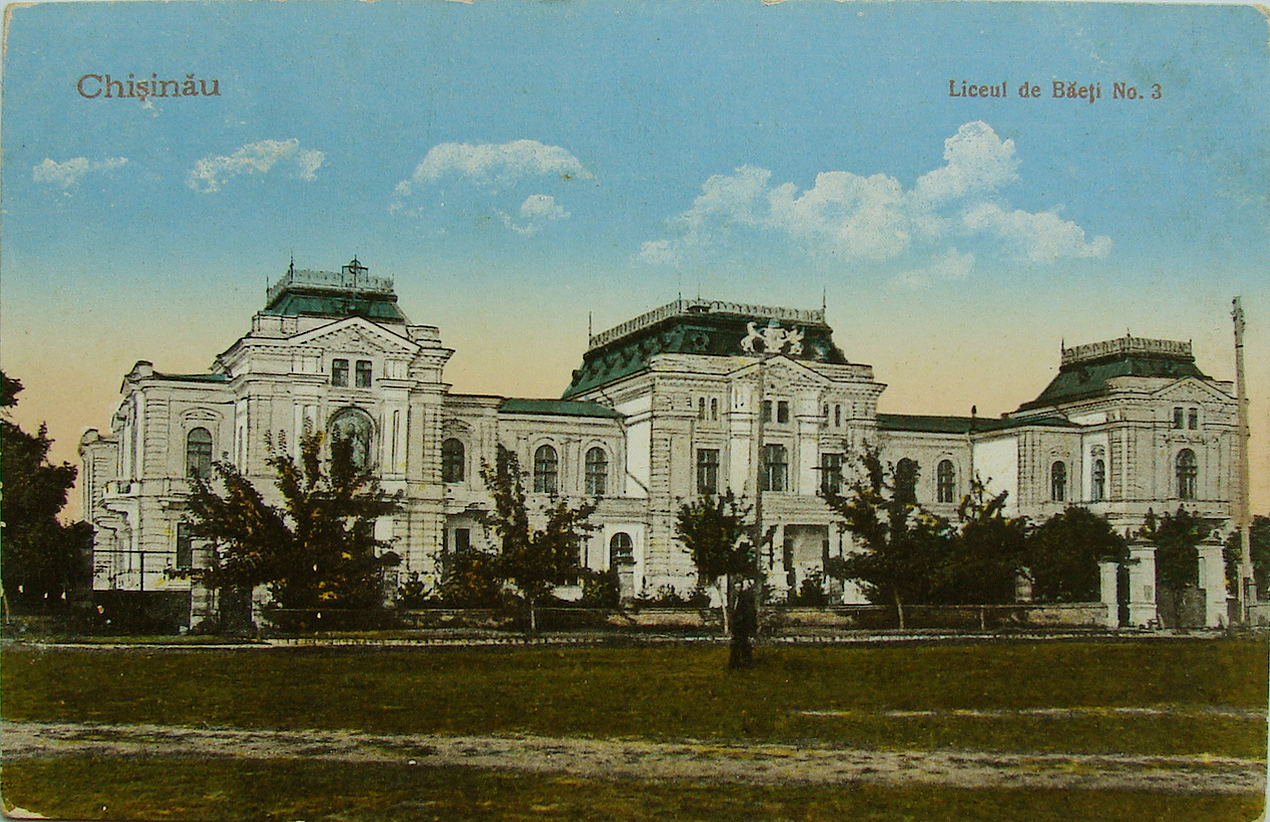The Moldavian Democratic Republic, also known as the Moldavian Republic, was a state proclaimed on December 2nd 1917 (December 15, the Gregorian calendar) by the Sfatul Țării (National Council) of Bessarabia, elected in October–November 1917 following the February Revolution and the start of the disintegration of the Russian Empire. This was the declaration of principle, voted in December 2nd .
Moldavians and brother nationalities of Bessarabia!
The Russian Republic is in great danger. The absence of central authority, and disorder throughout the country, which is exhausted by its struggle with the foreign enemy, is bringing the whole republic to destruction.
In this appalling situation, the only way of salvation for the Democratic Russian Republic is for its people to unite and take their fate into their own hands, establishing their national governments within the boundaries of the countries in which they dwell. By virtue of this fundamental principle and having in view the establishment of public order and the confirmation of the rights secured by the Revolution, Bessarabia, on the basis of her historic past, proclaims herself, from this day forward, the Democratic Moldavian Republic, entering into the structure of the Federative Democratic Russian Republic, as a partner with equal rights.

Up to the calling of the popular assembly of the Moldavian Republic, which is to be elected by all the people by direct, equal and secret vote, after the system of proportional representation, the highest authority of the Democratic Moldavian Republic is the Sfatul Țării (National Council) , constituted by the representatives of all the democratic revolutionary organizations, of the different nationalities, and of the zemstvos and the town administrations. The Executive Power in the Democratic Moldavian Republic is lodged in the Council of General Directors, responsible only to the Sfatul Țării (National Council). In view of the desires of the peoples living in the territory of the Moldavian Republic, the National Diet contemplates:
1) calling in the shortest possible time the Popular Assembly of the Moldavian Republic, chosen by universal, direct, equal and secret vote, according to the system of proportional representation.
2) distributing to the people all the land, without payment, on the basis of equitable utilization. Pending the enactment of a law regulating the transfer of the land to the working classes, and in order that there may be no disorders, and no waste of the riches of the soil, all the land not actually worked by the owner in person, together with the stock and the farm tools, shall pass under the charge of land committees, newly elected on a democratic basis. Sfatul Țării (National Council) shall enact detailed ordinances regarding the manner in which the land is to pass under the charge of the committees, and how they are to regulate the working of the land.
Forests, bodies of water, the riches of the subsoil, experimental station land, nurseries, beet sugar land, as well as vineyards and meadows belonging to the boyars (large land-owners), the monasteries, the Church and the Crown domains, and finally all the residences of the boyars, being the people’s universal property shall pass into the charge of the General Land Committee of the Moldavian Republic.
3) organizing the task of supplying the people with food and commodities of first necessity, regulating the labor of the workers, raising their pay and establishing in all enterprises the eight-hour day, and constituting national control of manufactures and of revenues over all the territory of the Moldavian Republic.
Sfatul Țării (National Council) contemplates working out a system of measures regarding the demobilization of the armies and the war-factories.
4) establishing direct elections in the local self-governing institutions, not as yet elected, on the basis of universal direct equal secret voting, with proportional representation; and fully guaranteeing the normal course of these institutions.
5) the defense of all the liberties won by the Revolution, viz., freedom of speech, of the press, of belief, of thought, of union, of assembly and of striking, and guaranteeing the inviolability of the individual and his home, and insuring immediate justice for every people.
6) the abolition for all time of the death penalty in the territory of the Moldavian Republic.The Kingdom of Roumania has always forbidden the death penalty.
7) the securing of full rights for every nationality living on the lands of the Moldavian Republic, giving them personal, national and cultural autonomy.
8) the inauguration of efforts to instruct all the peoples of the Moldavian Republic, on the basis of autonomy and nationality.
9) the immediate formation of national regiments, of soldiers born on Bessarabian soil, for the defense of the national resources from rapine during the period of the army demobilization, and to deliver the country from terrible impending anarchy.
10) the adoption of measures for the conclusion of peace without annexation of foreign territory and without war indemnities, every people being entitled to decide its own fate; peace should be concluded by an understanding with the Allies and with all the peoples of the Federated Democratic Russian Republic.
Moldavians and brother peoples of the Moldavian Republic!
At this awful moment, when we are standing on the verge of the abyss, of anarchy, of the shedding of brotherly blood, of poverty, famine and cold, the High Council of the country calls you round about it, that you may exert all your powers for the decisive struggle, together with all the peoples of the Moldavian Republic, to support it with every effort, and to protect the Russian Constitutional Assembly. The Council calls upon the Moldavians and upon all the affiliated peoples of Bessarabia to labor valiantly for the common weal, establishing a new life on the foundations of freedom, justice and fraternity. Only thus shall we bring our country safely through, and keep the great Russian Democratic Republic from perishing.

